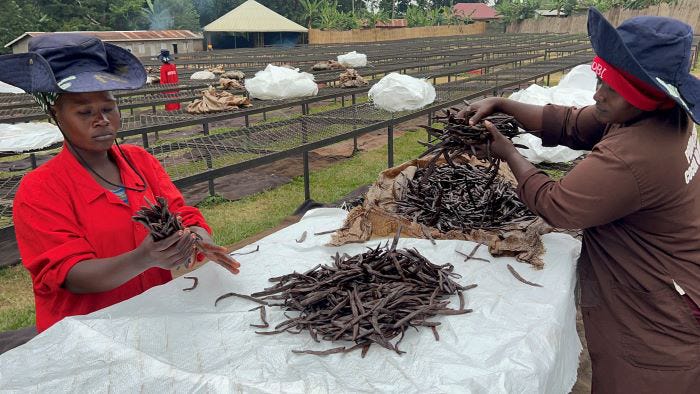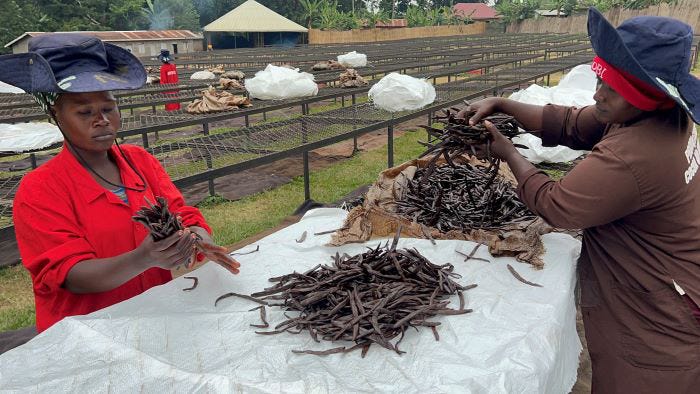Rebecca Skipp, Source Development Manager Frontier Co-op
At the beginning of August, I travelled to Uganda with Corey Rolffs, Frontier Co-op’s Supply Integrity Manager. We spent a week driving through the country, stopping almost every day in a new community to meet with local vanilla processors. Now, you might be saying to yourself, “Huh, I didn’t realize Uganda produced any vanilla.” There are, in fact, 15 countries globally that produce vanilla; Uganda ranks eighth in terms of total volume, with an estimated 185 metric tons produced in 2020. To put this into perspective, Madagascar, the world’s largest exporter of vanilla, produced 2,980 metric tons in 2020, which is more than 16 times Uganda’s volumes.
In 2018, Frontier Co-op joined a consortium led by Catholic Relief Services (CRS) to implement the U.S. Department of Agriculture-funded ‘Uganda VINES’ project. The goal of this five-year, $13 million project is to make Uganda the world’s next leading supplier of high-quality vanilla by
1. increasing agricultural productivity,
2. strengthening the enabling environment,
3. expanding trade of safe, high-quality vanilla, and
4. increasing access to markets.


As part of this team, Frontier Co-op provides technical assistance related to food safety and post-harvest handling. Since inception, we have helped to design food safety training courses, such as Good Manufacturing Practices (GMP) and Hazard Analysis and Critical Control Points (HACCP), and to review and finalize basic and intermediate audit processes. This visit to Uganda was our team’s first since the project started. We met with the first cohort of vanilla processors who have completed food safety training, and we helped to conduct a few basic and intermediate food safety audits. We were pleased to see the progress the processors have made since the beginning and even more importantly, so were they. One processor, for whom we completed an intermediate audit, shared the news that their buyers have commented on visible improvements in quality – from lower moisture levels and higher vanillin content to zero cases of mold in recent shipments.
COVID-19 served to highlight the global risks involved in sourcing from a single origin. This is further exacerbated by worsening climate disasters, economic recessions, and saturated markets. For Frontier Co-op, this project is a long-term investment to mitigate risk across our vanilla supply chain related to each of these issues by diversifying our sourcing partners. By building the capacity of these processors, Frontier Co-op and other global buyers are guaranteed access to a product that meets our stringent food safety standards. It also fits well into our co-op’s stated purpose: the idea that “doing good, works.” By improving the quality of processed vanilla from this region, these processors and their networks of smallholder farmers are able to diversify their revenue streams and increase their incomes, which can then be reinvested back into their families, their communities, and their businesses.
The Uganda VINES project still has another three years to go. By 2025, it is expected to reach 16,000+ farmers and increase export of cured vanilla to 987MT (~350MT/year). Frontier Co-op’s involvement is a great example of how our responsible sourcing strategy can have a positive impact in farming communities around the world.
